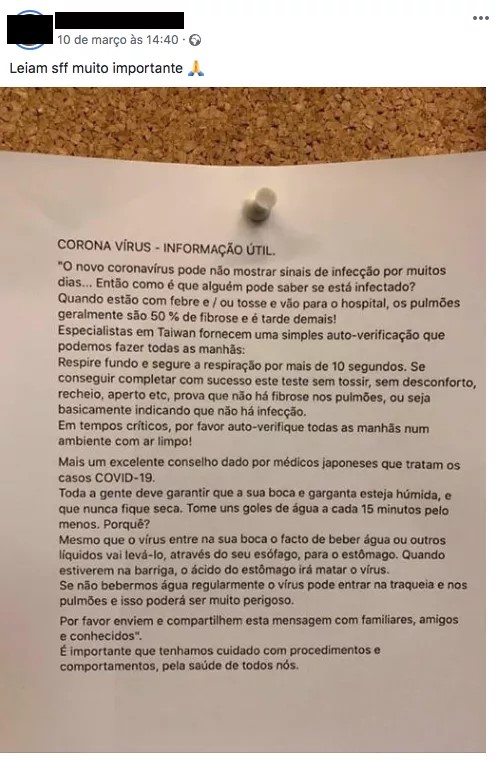“The new coronavirus may not show signs of infection for many days… So how can anyone know if they are infected? When people already have a fever and/or cough and go to the hospital, the lungs usually have 50% fibrosis and it's too late”, he begins by alerting himself in the text in question, shared by thousands of people on social networks over the past few days.
“Taiwan experts provide a simple self-check we can do every morning: Take a deep breath and hold your breath for more than 10 seconds. If you can successfully complete this test without coughing, without discomfort, stuffing, tightness, etc., this proves that there is no fibrosis in the lungs, that is, basically indicates that there is no infection”, he guarantees.

This claim is completely false, as the Polygraph had already pointed out in a recent article. However, the newspaper “Observador” has also verified that the much-vaunted self-diagnostic test has no scientific validity. However, false and misleading text persists in circulating on social networks.
The Polygraph contacted virologist Kamal Mansinho, who assured that “when a person goes to hospital with a fever or cough, there is no fibrosis in the lungs”.
“There is inflammation in the airways, but not necessarily fibrosis. Fibrosis is a late consequence of some types of infections. It's never right away. The example he gave has no validity. There is no basis, from the point of view of the mechanisms that lead to the development of fibrosis, to support this proof”, explained Manshinho.
Regarding the exercise of holding one's breath, Mansinho states that “what is proposed has no validity from a scientific point of view”.
Editorial note 1: This text was produced by the Polygraph staff and scientifically validated by the General Directorate of Health, within the scope of a partnership established between the two entities on a topic that is of unquestionable public interest.
Editorial note 2: This content was selected by Poligrafo as part of a fact-checking partnership with Facebook, aimed at evaluating the veracity of the information circulating on this social network.
On Facebook's rating scale, this content is:
False: the main content claims are factually inaccurate; generally, this option matches the “False” or “Mostly False” ratings on fact-checking sites.
On the Polygraph rating scale, this content is:
False
Editorial Note of Sul Informação: This fact-check was originally published in Poligrafo on March 14, at 18:16 pm and can be read here.



















Comments